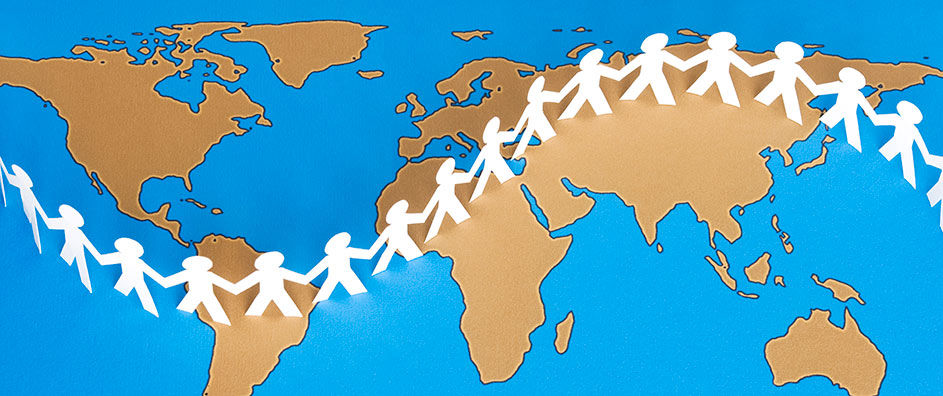The Bahá’í teachings articulate an expansive vision for a global community predicated upon the principles of love, trust, and unity. In a world increasingly polarized by division, these teachings urge individuals to transcend boundaries, fostering connections that underline our shared humanity. The fundamental tenets of the Bahá’í Faith promote a profound re-evaluation of interpersonal and societal relations, suggesting that the seeds of a just and loving global community must be cultivated through collective commitment and individual responsibility.
At the heart of this vision is the belief that every individual possesses inherent dignity and potential. Each person, regardless of their background, contributes uniquely to the tapestry of human experience. As such, the Bahá’í teachings encourage a shift in perspective from viewing diversity as a source of conflict to recognizing it as an enriching dimension of existence. This paradigm shift is essential for nurturing an environment where loving, trusting relationships can flourish.
Building a loving community begins with fostering a culture of empathy. Empathy requires a deliberate effort to understand the experiences and emotions of others. It transcends superficial interactions, necessitating a deep engagement with the perspectives of various individuals. By practicing empathy, members of a community can dismantle barriers of misunderstanding and mistrust. In a world rife with discord, empathy can serve as the cornerstone of reconciliatory efforts.
Moreover, the teachings stress the importance of service to humanity as a means of cultivating a trusting global environment. Service, in this context, is viewed not merely as an act of charity but as a fundamental expression of one’s love for others. Engaging in voluntary service helps individuals to step beyond their personal concerns, fostering a spirit of collaboration. This collective commitment to uplift those in need can lead to lasting communal bonds and a resilient global network.
To actualize these principles, the Bahá’í teachings advocate for the establishment of institutions that embody these values. Such institutions are designed to facilitate dialogue and cooperation among diverse groups, thus promoting social cohesion. By creating spaces where individuals can convene and share insights, the Bahá’í community endeavors to cultivate a climate of mutual respect and understanding. This approach allows for an exchange of ideas necessary for sustainable development and global harmony.
The necessity of education in this framework cannot be overstated. Education serves as a powerful catalyst for change. The Bahá’í teachings hold that education is a tool for moral and social advancement. A well-rounded education, which encompasses not only academic knowledge but also ethical and spiritual development, equips individuals to take an active role in fostering loving communities. In this sense, educational initiatives aimed at both children and adults become imperative for fostering a sense of global citizenship and communal responsibility.
Additionally, the teachings underscore the significance of justice as a foundational principle for building any community. A commitment to justice facilitates equitable interactions and challenges systems of inequality. It encourages individuals to confront their biases and work towards dismantling injustices that may pervade societal structures. In pursuing justice, the community can engender trust—a pivotal element in engaging with one another authentically and respectfully.
Furthermore, fostering loving and trusting communities requires a concerted effort to engage in dialogue—across cultures, religions, and racial identities. The Bahá’í teachings invite individuals to cultivate an openness to learning from one another. Engaging in constructive conversations that celebrate shared values while acknowledging differences can result in powerful connections, nurturing a deeper understanding and appreciation for one another. This process of dialogue reflects the Bahá’í belief that unity in diversity is not only a lofty ideal but a tangible goal.
In addition to dialogue, the active embodiment of love within communities is fundamental. Love is not merely an emotion, but a deliberate choice that manifests in actions. Acts of kindness, respect, and compassion are essential in solidifying bonds of trust. The Bahá’í teachings expound on the notion that love is an unifying force capable of overcoming adversity. When individuals consistently express love toward one another, the potential for building a supportive and nurturing environment is greatly enhanced.
The vision for a loving and trusting global community posited by the Bahá’í teachings requires ongoing commitment. It calls upon individuals to engage in lifelong learning and self-reflection. The pursuit of personal growth invariably contributes to communal well-being, reinforcing the interdependence of all. Each act of kindness, each moment of understanding, each endeavor to champion justice contributes to an overarching vision that can transform the world.
Ultimately, the construction of loving and trusting global communities rests upon the active participation of individuals who are willing to heed the invitation of the Bahá’í teachings. It is an invitation to transcend limitations, embrace our shared humanity, and recognize that the journey toward global community is collective. In this unfolding narrative, every person has a role to play, and together we can cultivate a world characterized by love, trust, and unprecedented collaboration.
